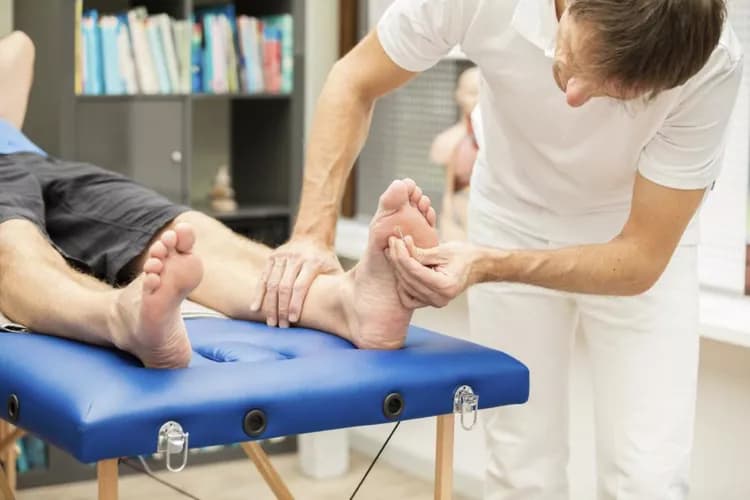For the 25 percent of type-2 diabetes patients who suffer from numbness and extreme nerve pain in their feet, a new dermatological treatment being tested by Northwestern Medicine scientists could potentially help prevent and maybe even reverse the neuropathy.
In a study just published in Molecular Pain, Northwestern Medicine researchers showed that depleting a chemical called GM3 through genetic modification prevented the development of neuropathy in obese diabetic mice.
Applying gene therapy ointment to try to reverse debilitating pain, neuropathy
The researchers are now applying a gene therapy ointment to deplete GM3 and GM3 synthase, which is the enzyme that makes GM3. The hope is that this GM3-depleting ointment, applied just to the footpad of diabetic mice, will prevent or, even better, reverse the existing neuropathy.
"We have such terrible treatments right now for the neuropathy of diabetes," said corresponding author Dr. Amy Paller, the Walter J. Hamlin professor of dermatology at Northwestern University Feinberg School of Medicine and director of Northwestern's Skin Disease Research Center. "We're basically only treating the pain. This is a novel pathogenesis-based approach that looks at what's causing the neuropathy and reverses that instead of just treating the pain."
Paller also is an attending physician at the Ann & Robert H. Lurie Children's Hospital of Chicago.
The type of neuropathy the researchers are trying to treat goes beyond the typical numbness some patients with neuropathy experience, said first author Dr. Daniela Menichella, assistant professor of neurology at Feinberg whose focus is the clinical care and laboratory-based research of diabetic neuropathy.
"It's not that you just don't have sensation in your feet," Menichella said. "You have shooting pain, which is the unbearable part. Pain is a debilitating affliction and one of the worst complications of diabetes."
Depleting GM3 in diabetic mouse models prevents neuropathy
Leading up to this treatment, the researchers had discovered that routine diabetic mice had a lot more GM3 and GM3 synthase in their nerves compared to normal mice. They found the same thing to be true in the skin of mice and humans with diabetes.
The scientists then compared the appearance and function of the nerves in mice in which GM3 was depleted by genetic manipulation. In routine diabetic mouse skin, the nerves had virtually disappeared from degeneration, but they were absolutely normal in appearance in the GM3-depleted mice, even though the mice were as obese and diabetic as the routine diabetic mice.
To test response to pain, researchers used filaments of increasing force to touch the paws of mice and then timed how long it took for the mice to withdraw their paw from the pain stimulation.
"The routine diabetic mice had nerve changes that intensified their pain sensation, and they experienced a lot of pain with just a light touch," Paller said. "When we rescued them by depleting their GM3, they didn't withdraw their feet (suggesting pain) any more quickly than the mice without diabetes."
Based on these discoveries, the researchers have advanced the approach to regionally depleting GM3 in the feet with the novel ointment.
"If the studies look promising in mice, our long-term goal would be to further test safety and advance to human clinical trials to prevent and/or reverse the development of diabetic neuropathy," Paller said.
Materials provided by Northwestern University. Original written by Kristin Samuelson. Note: Content may be edited for style and length.
Disclaimer: DoveMed is not responsible for the adapted accuracy of news releases posted to DoveMed by contributing universities and institutions.
Primary Resource:
Menichella, D. M., Jayaraj, N. D., Wilson, H. M., Ren, D., Flood, K., Wang, X. Q., ... & Paller, A. S. (2016). Ganglioside GM3 synthase depletion reverses neuropathic pain and small fiber neuropathy in diet-induced diabetic mice. Molecular Pain, 12, 1744806916666284.
Related Articles
Test Your Knowledge
Asked by users
Related Centers
Related Specialties
Related Physicians
Related Procedures
Related Resources
Join DoveHubs
and connect with fellow professionals


0 Comments
Please log in to post a comment.